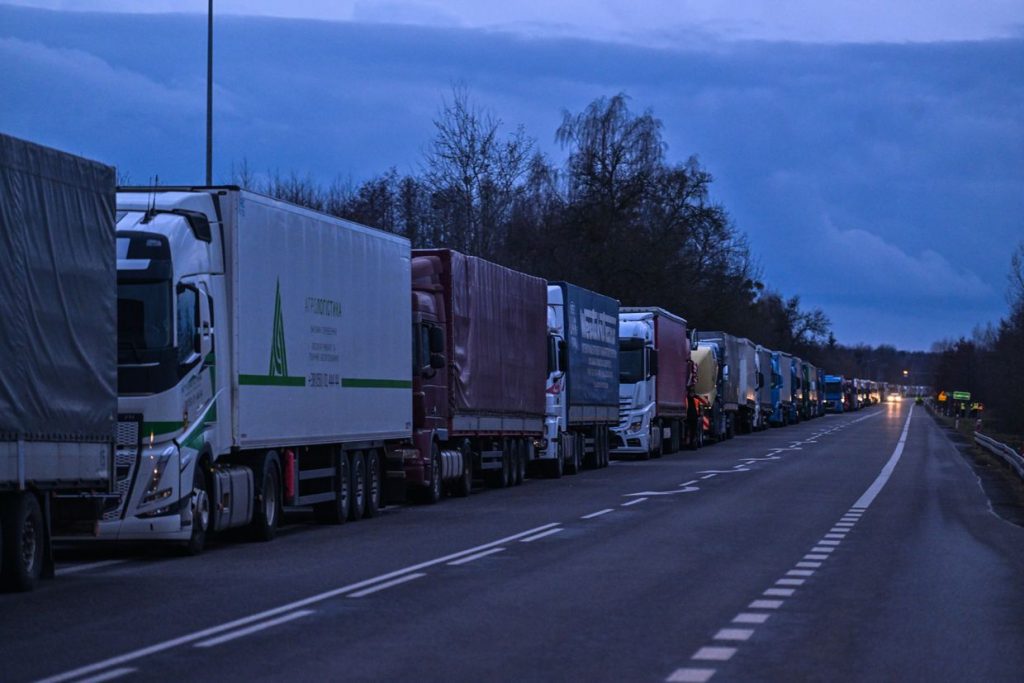Polish farmers protesting at the Polish-Ukrainian border have recently lifted their blockade at the Uhryniv-Dolhobychuv crossing point, as announced by Ukraine’s State Border Guard Service. The protest, which began in February, was in response to Ukrainian agricultural imports and the EU’s Green Deal. The blockade led to deteriorating relations between Kyiv and Warsaw, as protestors spilled Ukrainian grain, causing outrage in Ukraine. However, Ukraine’s Prime Minister Denys Shmyhal met with his Polish counterpart, Donald Tusk, to discuss agricultural trade between the two countries. They agreed to search for mutually satisfactory solutions, including a verification and control system for the trade in agricultural goods. Despite the tensions over agricultural policies, Poland has been supportive of Ukraine, providing military aid and hosting Ukrainian refugees.
In an effort to address the ongoing protests and improve bilateral relations, Poland and Ukraine recently established a Council for Cooperation to manage Polish-Ukrainian relations and support Ukraine’s reconstruction efforts. This move comes after the Polish farmers ended their blockade at the border, signaling a willingness to work towards resolving the issues that led to the protests. The establishment of the Council demonstrates a commitment to finding solutions that benefit both countries and strengthen their cooperation in various areas. Despite the challenges presented by the protests, the formation of this Council shows a proactive approach to addressing concerns and fostering positive relations between Poland and Ukraine.
The blockade at the Polish-Ukrainian border by Polish farmers has been a source of tension between the two countries, as it disrupted the flow of goods and highlighted disagreements over agricultural policies. The lifting of the blockade at the Uhryniv-Dolhobychuv crossing point marks a significant development in the ongoing dispute, as it opens the door for negotiations and dialogue between the two parties. By lifting the blockade, the Polish farmers have shown a willingness to engage in discussions and seek solutions to the issues that led to the protest. This move towards de-escalation is a positive step in resolving the conflict and improving relations between Poland and Ukraine.
Despite the challenges posed by the protests and the blockade, Poland has shown support for Ukraine in various ways, including providing military aid and hosting Ukrainian refugees. The $3.2 billion in military aid from Poland has been crucial in supporting the Ukrainian military in its efforts to defend its sovereignty and security. Additionally, hosting around 1 million Ukrainian refugees has showcased Poland’s commitment to assisting those in need during times of crisis. These gestures of support from Poland demonstrate a strong bond between the two countries, even amidst disagreements and protests over agricultural policies. The support from Poland has been instrumental in helping Ukraine navigate challenging times and strengthen its defenses and resilience.
The discussions between Ukraine’s Prime Minister Denys Shmyhal and his Polish counterpart, Donald Tusk, reflect a shared commitment to finding mutually beneficial solutions to the issues surrounding agricultural trade between the two countries. By engaging in dialogue and cooperation, both parties have shown a willingness to work together towards resolving disagreements and fostering better relations. The agreement to establish a verification and control system for agricultural goods trade demonstrates a proactive approach to addressing concerns and ensuring fair and transparent trade practices. This collaborative effort to find solutions highlights the importance of diplomatic engagement and mutual understanding in resolving conflicts and building stronger ties between nations.
In conclusion, the lifting of the blockade at the Polish-Ukrainian border by Polish farmers marks a positive development in the ongoing dispute and paves the way for constructive dialogue and cooperation between the two countries. The establishment of the Council for Cooperation and the discussions between Ukrainian and Polish officials demonstrate a commitment to finding solutions and improving bilateral relations. Despite the challenges and tensions that arose from the protests, Poland’s support for Ukraine through military aid and refugee assistance has been a significant contribution to strengthening the bond between the two nations. Moving forward, continued engagement, understanding, and cooperation will be essential in resolving differences and building a more prosperous partnership between Poland and Ukraine.


